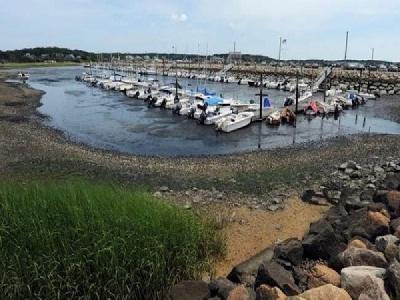
Posted on August 9, 2016
By Mary Ann Bragg, Cape Cod Times
With a multimillion-dollar municipal dredging project on the horizon in Wellfleet Harbor, sailboat charter captain Eric Hansen worries that the waterfront may lose its charm. Others boating out of the harbor, though, say a maintenance dredge, after more than a decade, is needed.
“It is quite shallow,” Hansen said. “From where my boat is parked, I cannot get out up to two hours around low tide.”
But still, he’s not “gung-ho” that the harbor has to be dredged.
“It keeps it small and it keeps it quaint,” he said. “I like that about this harbor. Having it so shallow helps maintain that.”
At the height of the summer’s tourist season, selectmen agreed unanimously Tuesday to apply for two major permits for a maintenance dredge project around the town marina area and in a town mooring basin, south of the pier. A partial maintenance dredge was last done in 2002. With the selectmen’s approval, town officials are submitting a notice of intent under the state Wetlands Protection Act, with endangered species program paperwork for northern diamondback turtles, and submitting an application for a permit to the Army Corps of Engineers, town records indicated.
“There is an economic impact of not having a viable harbor at reasonable times on each side of the tide,” Selectmen Chairman Dennis Murphy said. “People would like to launch boats here. Launching fees are down. People come, and if there is no water in the harbor and the smell is offensive they might not be so apt to go into a restaurant to eat. A clean, healthy Wellfleet harbor is the thing we’ve had since the 1600s. It goes back a ways, and we’d like to see that continue. To do that, we need a harbor that is navigable.”
A dredge of 38.5 acres to a depth of 6 feet below mean low water is needed for both economic and safety reasons, despite the price tag of about $13 million, Harbormaster Michael Flanagan said. Flanagan estimated that the town loses about $100,000 annually in revenue at the pier because of the tidal restrictions.
Others harbors in the area where commercial and recreational fishermen could go are Rock Harbor in Orleans, Sesuit Harbor in East Dennis, Pamet Harbor in Truro and Provincetown Harbor, Flanagan and local charter captains said.
“It’s an absolute must,” said John Wolf, a sailboat charter captain and member of the town’s marina advisory committee. “The harbor is virtually unusable for eight hours out of every 24 hours. It’s a safety issue. If anybody gets in trouble on their boat, when the tide’s out, or if someone has a heart attack, nobody can get out there to rescue them.”
The silt, known as black mayonnaise, is also starting to get into the commercial oyster beds in the harbor, Wolf and Murphy said.
While Flanagan says that getting permits for a dredge takes a long time, and even more so when endangered species are involved, fishing charter captain Jerre Austin called for a maintenance program of dredging every few years to reduce the cost.
“It’s almost two hours on either side (of low tide),” Austin said. “It’s put a damper on my business, no question about it.”
Members of the town’s natural resources advisory board say that more needs to be done to reduce the need for future dredging. At the annual town meeting this year, at the request of the board, voters set aside $25,000 to find out if changes in the town marina design could change the movement of sediment in the area.
“We’re just getting underway,” Natural Resources Advisory Board Chairman John Riehl said of the study that he emphasized is for future planning, and not a substitute for or meant to reduce the cost of the upcoming dredge project. “To me, that study gives us some time to do some planning and move forward in a sensible manner.”
With the dredge project, the town proposes to dig up 364,500 cubic yards of mud using a bucket dredge, and then haul it to a disposal site in Cape Cod Bay, Flanagan said. The black mayonnaise, a viscous and semi-fluid muck, is complicated to dredge because it is difficult to contain and tends to flow by gravity from undredged areas to dredged areas, the town’s 2006 harbor management plan states.
The muddiness of the sediment may be related to factors such as man-made structures in the harbor such as the breakwater built by federal officials many years ago, and to the type of tidal energy in the harbor where the flood tide is stronger than the ebb tide, based on a study by local coastal geologist Graham Giese.
“Anything that the tide brings in just settles out in here,” Flanagan said.
A majority of the cost of the dredge project could be borne by the state, Flanagan said.
The municipal dredge would follow a dredge of a federal channel farther out in the harbor and an anchorage area near the pier, Flanagan said. The federal dredge, which the town doesn’t have to pay for, could occur within a year or so, he said.
For fishing charter captain Kevin Coakley, the tidal restrictions are a hassle but he said he hasn’t lost business.
“It just screws up my timing,” Coakley said.” I have to play the tides a lot more. It’s more of an inconvenience for me than anything.”
Source: Cape Cod Times





